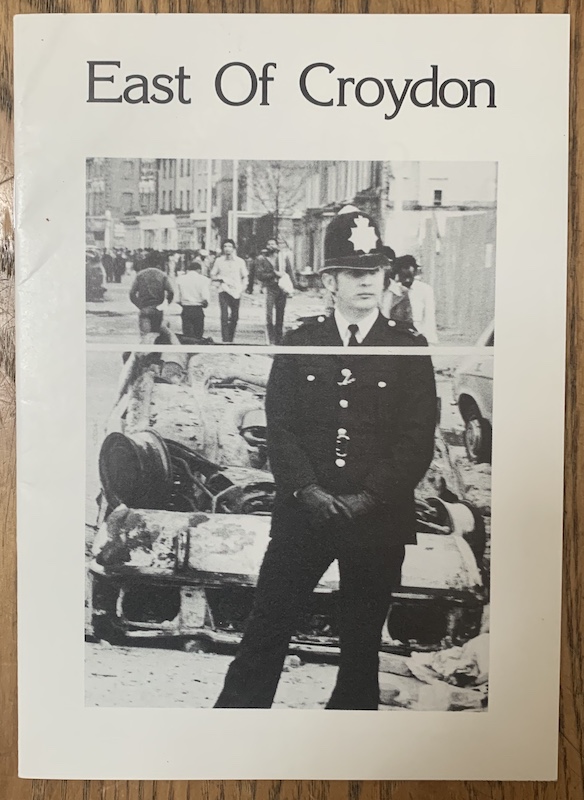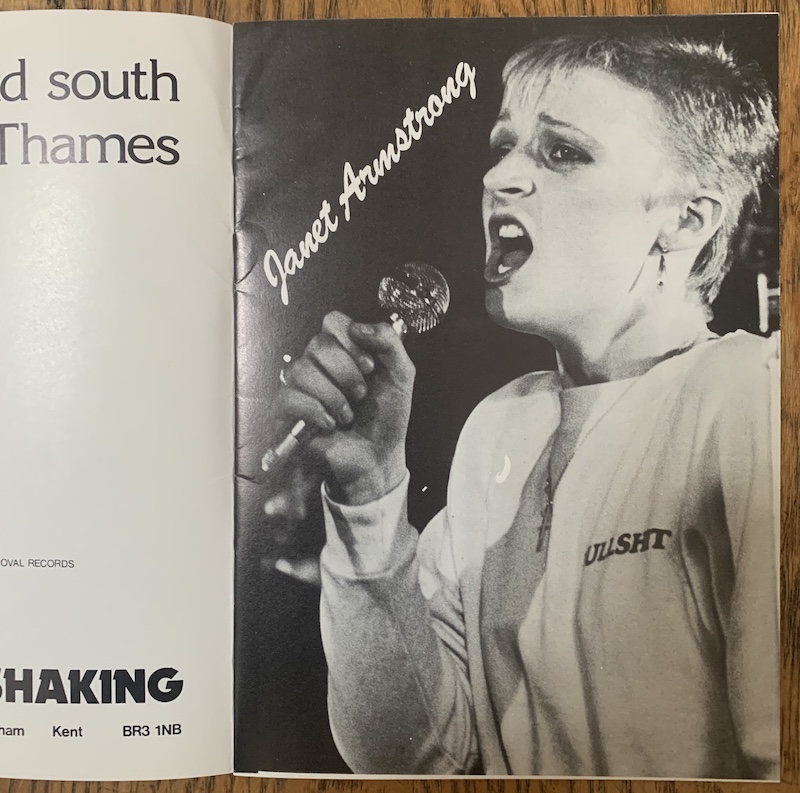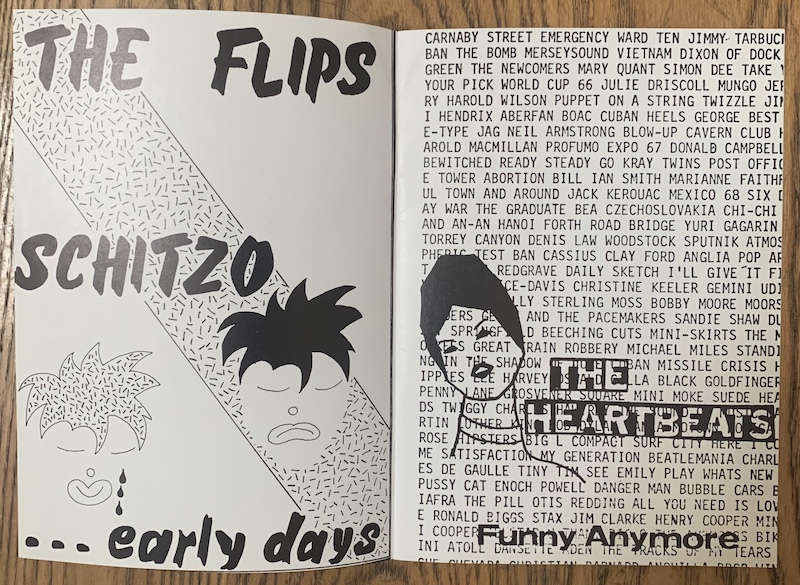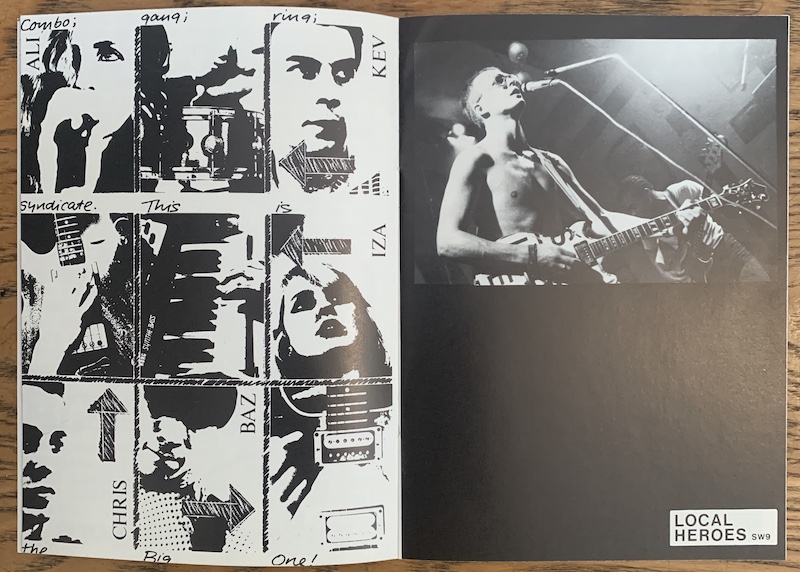The thing about music (and most art for that matter) is that if you try to define something by coming up with a label for it, there’s a good chance you’ll end up spending more time thinking and talking about what doesn’t fit that label than what does. And if you’ve spent any time discussing music with record collectors, you know there’s nothing they love more than proclaiming what something isn’t. And making a huge deal out of it for no reason. The same losers who rioted at the 1913 premier of Stravinsky’s “Rite of Spring” and yelled “Judas!” at Bob Dylan in 1966 (even though by that point he had released both “Bringing It All Back Home” and “Highway 61 Revisited”, two mostly electric albums) were the same dorks who didn’t like Bad Religion’s “Into the Unknown” and got mad at Bad Brains when they played reggae. You can quote me on that. There’s even an entire sub-genre of punk that’s very popular in almost every continent on earth and is almost entirely based on deciding what’s authentic and what isn’t. It’s called “black metal.”
This is why I’ve always loved the label “DIY”. Even if I know nothing about a person’s taste or knowledge of music, if we’re trying to communicate with each other in regards to any obscure or independently released record that came out in the UK or the US in the 7-8 years after “Never Mind the Bullocks” was released, and owes anything at all to any sort of subculture that at any point in time might have been informed or influenced by the release of that record, even if it is a direct artistic condemnation of the Sex Pistols and all they might or might not have stood for, if that person describes the record in question as “DIY”, I have a pretty good idea of what they’re talking about and odds are I will find at least something to like about it.
He didn’t coin the term but Johan Kugelberg’s “DIY Top 100” list in Ugly Things #19 from Summer 2001 undoubtedly introduced the term “DIY” to many, many punk collectors, or at least attempted to clearly define it as a sort of sub-genre of post-punk (and succeeded if you ask me). Kugelberg defined DIY as what came after what we consider “real” 70’s punk became stale and young people became bored with it or realized that like a lot of “artistic revolutions” it was a lot of smoke and broken mirrors. Kugelberg declared he’d, “much rather spend my turntable time with a couple of dozen out of tune off-beat UK art school crap 45’s from the late 70’s..” And once I heard a handful of records on that list, I felt the exact same way! Why spend $6700 on a Misfits 7″ when you could spend $19 on the Prats “Disco Pope” 7″? It’s a no-brainer!
Once the eBay smoke that the Kugelberg DIY list produced started to clear, dealers everywhere were kinda realizin’ that a lot of the weirdo US, UK, European, Japanese, etc 70’s and 80’s records cloggin their bins because they weren’t “punk” enough to appeal to the KBD crowd and not “smart” enough to appeal to the…I dunno…Table of the Elements crowd, a lot of those records could be reclassified and re-listed as “UK DIY” and BOOM..the cash might start to roll in… And roll in it did. Suddenly Restricted Code and the Nightingales were the same “genre” as the Desperate Bicycles and the Scrotum Poles, and commanding the same prices. Discerning buyers who had flipped past those records already knew the deal but plenty fell for the ruse via eBay or those weird European sites like “cdandlp.com” or Music Stack or whatever. Not the end of the world as a lot of those pop and post-punk records were actually pretty good, just not $50 a pop good…
The thing that ended up working out for me personally when all these UK and European dealers started posting for sale anything and everything that was released between 1977 and 1986 and calling it “DIY” was my discovery of what seemed like an endless number of regional UK compilations. It seemed like in the late 70’s and early 80’s every neighborhood, borough and suburb of London had its own scene and at least one compilation to document it. A lot of these comps were cheaply made cassettes but this also meant, whether you were a 17 year old alone in his parents’ basement with his first synthesizer or a high school band with a horn section that fancied themselves the next Specials, if you could come up with a half decent recording, you could make it to vinyl at least once. You had DIY comps like “Mell Square Musick” (previously written about here a few months back) that combined bands that were pure three chord pub punk with sleek mods with primitive pop sensibilities. You had 7″ comps like “8 From ’80: A Carlisle Compilation” that featured the primitive Ramones-worship of The Toolbox Murders and out of Scotland “The Simple Approach to Newtown Products” 7″ with the thuggish punk of Crimedesk along with Story So Far, who sound like they learned to play their guitars the day they recorded their track. You have the more new wave-y but still punk-spirited bands on 1980’s “Swindon This Is Swindon” 7″ from Southwest England near Bristol. Also from 1980, from Edinburgh, Scotland “Mint Sauce For the Masses” 7″, 1979’s “The Blank Tapes Volume 1” 7″ from Birkenhead, England, 1981’s “The Epigram EP” 7″ which featured more poppy bands from around North London and Cambridge. The London Fuck Off Records/Deleted Records scene produced some great LP comps like “We Couldn’t Agree On A Title” in 1981 and “Love Not Devotion” from 1982, both featuring electronic DIY heroes the Instant Automatons. Also from 1981 you had the minimal synth and electronic pop heavy “From Bromley With Love” LP featuring bands from Bromley, a small town in South London, 1981’s “Welcome To Norwich – A Fine City” LP from Norfolk in the NE from Bristol, and from 1979, the 2 volume “Avon Calling” compilation LPs which featured an eclectic mix of bands including the Glaxo Babies that seems to touch on every type of sound that could fall under the umbrella of “post punk.” From Manchester in the years Joy Division was struttin around you had the “Unzipping the Abstract” LP from 1980 and the “A Manchester Collection” LP from 1979. From 1981 the “Where the Hell Is…Leicester?” LP. The more I think about it, if we’re just talking “DIY” in the way I’ve defined it here, I would even go as far as to say the legendary “C86” compilation cassette/LP released by the not-so-DIY NME in 1986 would fall under the category of “DIY”. I can assure you, there are a lot of bands on these aforementioned comps that wouldn’t sound out of place on Ron Johnson or Postcard Records. Aside from “C86”, 100% of these comps were released on tiny independent labels and many of them were the only record the label ever released. Even if the head of the label was the son or daughter of a member of Parliament I doubt they had much help putting these things together aside from the cash to get them pressed.
This all brings us to one of my favorite comps from this era: the “East of Croydon” LP from south London, 1981. I think the closest anyone on this comp came to any sort of fame is Janet Armstrong who, aside from providing the first track on Side A here, sung backup vocals on David Bowie’s “Absolute Beginners”. Her offering sees Gang of Four guitars riding a dub-inflected Siouxie & the Banshees-esque track to start off the album. Janet’s brother Keith Armstrong plays on no less than 3 of the tracks on the record, all with different bands, including the band he’s probably best known for: the dark and moody post-punk unit Normil Hawaiians. The most primitive track on here, “Fly On the Wall” from Spoon Fazer, sounds like a classic one-man DIY synth project recorded by someone with a drum machine that still has a price tag hanging off it. My favorite track is by Greenfield Leisure who contribute what almost sounds like a radio jingle for their own band called “Leisure” which would 100% fit in on the “C86” comp or alongside bands like Mighty Mighty, Big Flame and the the bass-slappy pop of the Ron Johnson roster. The liner notes of the LP are in the form of a postcard-sized printed booklet which, like all good 90’s emo hardcore compilations, gives a page to each band to provide their own art/lyrics/liner notes/contact info/etc.




Now, I’m not going to argue that any of the bands on any of these records are “good” according to any standards of any type of music be it punk, post-punk, synth whatever. That’s not the point. There are some legitimately “good” bands on some of these records that contribute some legitimately amateurish and forgetful crap as they were still on their way to figuring “it” out. As regional comps from any time and place are a snapshot of a particular scene, these are fascinating documents of bands of all types who saw punk happen as it happened, or maybe just caught its tail end..or maybe even were too old for punk as it happened but then road its coattails into the 80’s as the weird shit they were doing before the Sex Pistols exploded was then (finally) accepted by slightly more open-minded audiences all over the world. “East Of Croydon” was always fascinating to me as there’s virtually nothing classically “punk” about any of the bands on the record, or their music, yet it’s a collection of “DIY” independent bands from a small community in London, UK just a few years after the Sex Pistols scared the hell out of their parents, teachers and politicians. Everything about this record epitomizes “UK DIY” to me yet I can’t say anything aside from that aesthetic ties the bands together besides their location and sharing a few members. In 2020 as music is spread almost exclusively via essentially anonymous online entities with no physical location or national association (or identity, really), will bands being presented to the public audience via curated compilations representing individual scenes with real identities be a thing of the past forever??? I kinda hope so.




